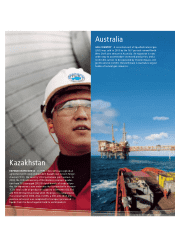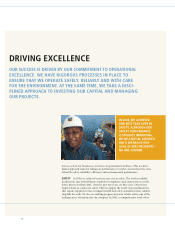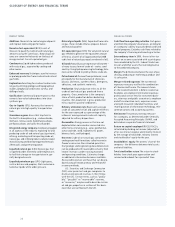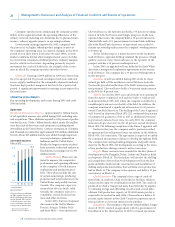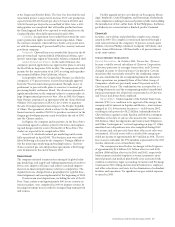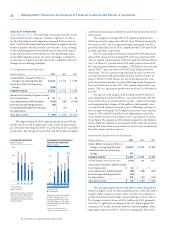Chevron 2003 Annual Report Download - page 23
Download and view the complete annual report
Please find page 23 of the 2003 Chevron annual report below. You can navigate through the pages in the report by either clicking on the pages listed below, or by using the keyword search tool below to find specific information within the annual report.
21
DAVE O’REILLY
CHAIRMAN OF THE BOARD
AND CHIEF EXECUTIVE OFFICER
Many of our employees and contractors work under very
trying and challenging circumstances. This past year, our
Venezuelan employees kept operations running safely
despite a national oil strike. Our employees in the Par-
titioned Neutral Zone between Kuwait and Saudi Arabia
also kept operations running smoothly and safely during
the Iraqi war. This award is a testament to all the people of
ChevronTexaco who work every day to deliver reliable and
affordable energy – the right way.
THE REPUTATION OF THE PETROLEUM INDUSTRY CON-
TINUES TO SUFFER. WHAT CAN BE DONE TO IMPROVE IT?
As an industry, we must continue to improve our collective
performance and be responsive to public concerns about
the impact of our operations. If we fail to be responsive, our
industry’s reputation will continue to suffer, and we will
continue to be constrained by increased regulations and
lack of access to resources. Additionally, it could hinder
our efforts to attract talented people to our business. This
industry has a powerful and positive story to tell, and
we should be neither shy nor apologetic about telling it.
We provide the energy that powers the world’s economic
engines. The energy we produce is essential to improving
quality of life, especially in developing countries. That is
something to be proud of, and we need to reinforce that
message through effective communications.
must help local populations make sustainable improvements
in their economies and be open to working with all stake-
holders, including industry. Business, for its part, should
be focused on making wise investments, creating jobs and
running sound, profi table operations. But it must also work
collaboratively with both governmental and nongovern-
mental organizations to improve the quality of life where
it operates.
YOU HAVE SPOKEN OF THE NEED TO ENCOURAGE ENERGY
CONSERVATION. WHY WOULD A COMPANY THAT IS IN THE
BUSINESS OF SELLING ENERGY GLOBALLY WANT PEOPLE TO
USE LESS OF IT?
We are in this business for the long term. If we want to
continue to promote economic growth, conservation will
help keep energy supplies plentiful and affordable. There
are environmental benefi ts to conservation as well. It may
be the single most effective way to reduce greenhouse gas
emissions. So its importance cannot be overstated.
CHEVRONTEXACO RECENTLY RECEIVED THE U.S. STATE
DEPARTMENT’S CORPORATE EXCELLENCE AWARD FOR ITS
LONG-TERM HUMANITARIAN EFFORTS IN NIGERIA. SURELY
THAT WAS A PROUD MOMENT.
Absolutely. Our Nigerian operations have a long history
of working with local communities to help improve their
quality of life. This past year was especially diffi cult because
of civil unrest near our Escravos natural gas terminal on
the Niger Delta. Our Nigerian employees not only ensured
their own safety and the safety of our facilities, but they also
airlifted people in the local community to safety.



